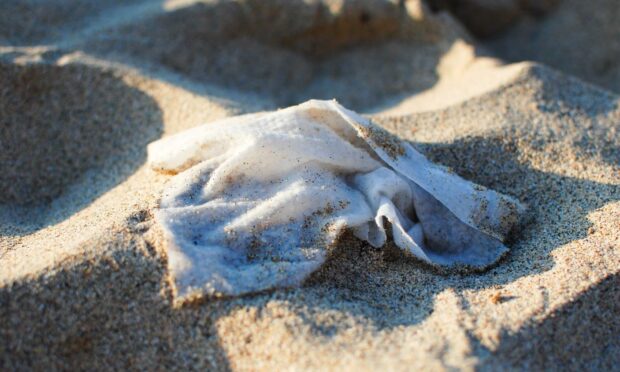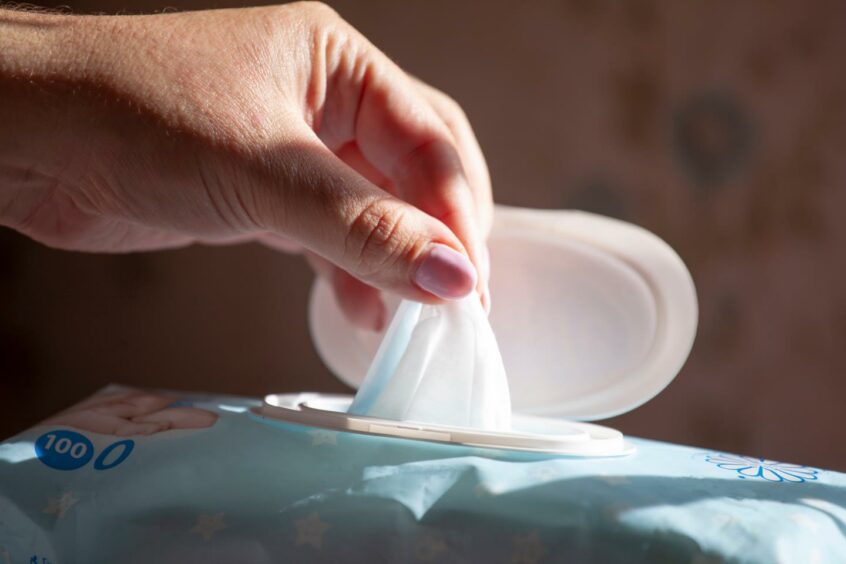Scots are being urged to ditch wet wipes once and for all due to the environmental damage and blockages they cause.
Around 11 billion wipes are estimated to be used in the UK each year, and 90% of them contain plastic that will never break down.
What sort of damage do wet wipes cause?
Thousands of wipes are found on beaches each year, after being mistakenly flushed down the toilet.
Thousands more end up contributing to sewer blockages and fatbergs which cost vast sums of money to fix.
Scottish Water is now calling for a ban on the sale of wet wipes after responding to a huge number of such blockages.
The publicly-owned water provider has also launched a campaign backed by the Scottish Government to encourage people to “bin the wipes and join the wave.”
The “Nature Calls” campaign is asking the public to stop flushing wipes down the sewer system or preferably, stop using them altogether.
Douglas Millican, Scottish Water chief executive, said: “Our message to our customers is clear: please bin the wipes and help us protect the environment.
“And to policymakers we say now is the time to ban all wipes containing plastic and rid our sewers, rivers and beaches of this needless problem.”
He explains that in 2021, more than 10,000 tonnes of material – the equivalent of 80 blue whales – was removed from Scotland’s waste water plants.
“Many thousands of tonnes more ended up blocking sewers, causing flooding, or being flushed into rivers during storms and heavy rain,” he said.
Around 80% of the 36,000 blockages Scottish Water attend each year feature wipes.
Clearing the issues costs customers £7 million annually.
But how do the wipes end up on north-east beaches?
Research by the Marine Conservation Society has shown that wipes consistently crop up as one of the most commonly found items on Scottish beaches.
“Our volunteers across Scotland have been picking up wet wipes from Scottish beaches for years including in the north east from Dundee to Cummingston,” said Catherine Gemmell, Scotland conservation officer for the Marine Conservation Society.
Between 2015 and 2020, volunteers across Aberdeenshire, Angus, Perth and Kinross picked up an average of 8.5 wet wipes per 100 m stretch of beach.
“The issue is even more prevalent in the central belt where volunteers at an Edinburgh beach have picked up over 30,000 wet wipes in the last five years,” said Catherine.
“No one wants to be sunbathing or swimming amongst wet wipes. The time to act is now.”
Catherine explains that the majority of wet wipes contain plastic which can endanger wildlife through either entanglement or ingestion.
These plastic wipes will never truly breakdown. Instead they get smaller and smaller, turning into microplastics which throws up a whole range of new issues.
“This is why we support the new Scottish Water campaign calling for a ban on plastic wet wipes,” Catherine said.
“Wet wipes on our beaches are bad news for both people and wildlife so we’re asking everyone to watch what you flush and support the call to ban plastic wet wipes to help wipe them out from Scottish beaches’
The campaign is asking governments both north and south of the border to work together and ban wipes containing plastic, not just here in Scotland.
Would a ban actually work?
Scotland was the first part of the UK to ban plastic-stemmed cotton buds in 2019.
The number of these buds found on Scotland’s beaches dropped by 50% between 2020 and 2021 following the ban.
Similarly, the number of single-use plastic bags found has more than halved since charges across the UK were introduced.
Going by these statistics from the Marine Conservation Society, restricting single-use plastic items seems to work.
Tesco have revealed they will no longer be selling wipes containing plastic at their stores, with a spokewoman telling The Times: “There is no need for wet wipes to contain plastic so from now on we will no longer stock them if they do.”
New laws will also come into force in June which will ban some of the “most problematic single-use plastic items” in Scotland.
These include plastic cutlery, plates, drink stirrers and polystyrene cup and take away boxes.
How can I support the wet wipes ban?
You’ve got until March 22, 2022 to share your views on the Scottish Government’s Marine Litter Strategy Consultation.
Reach the consultation and give your views here



